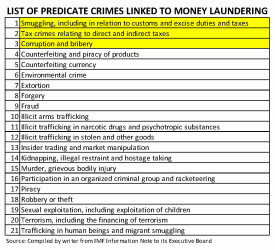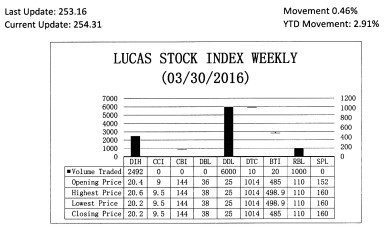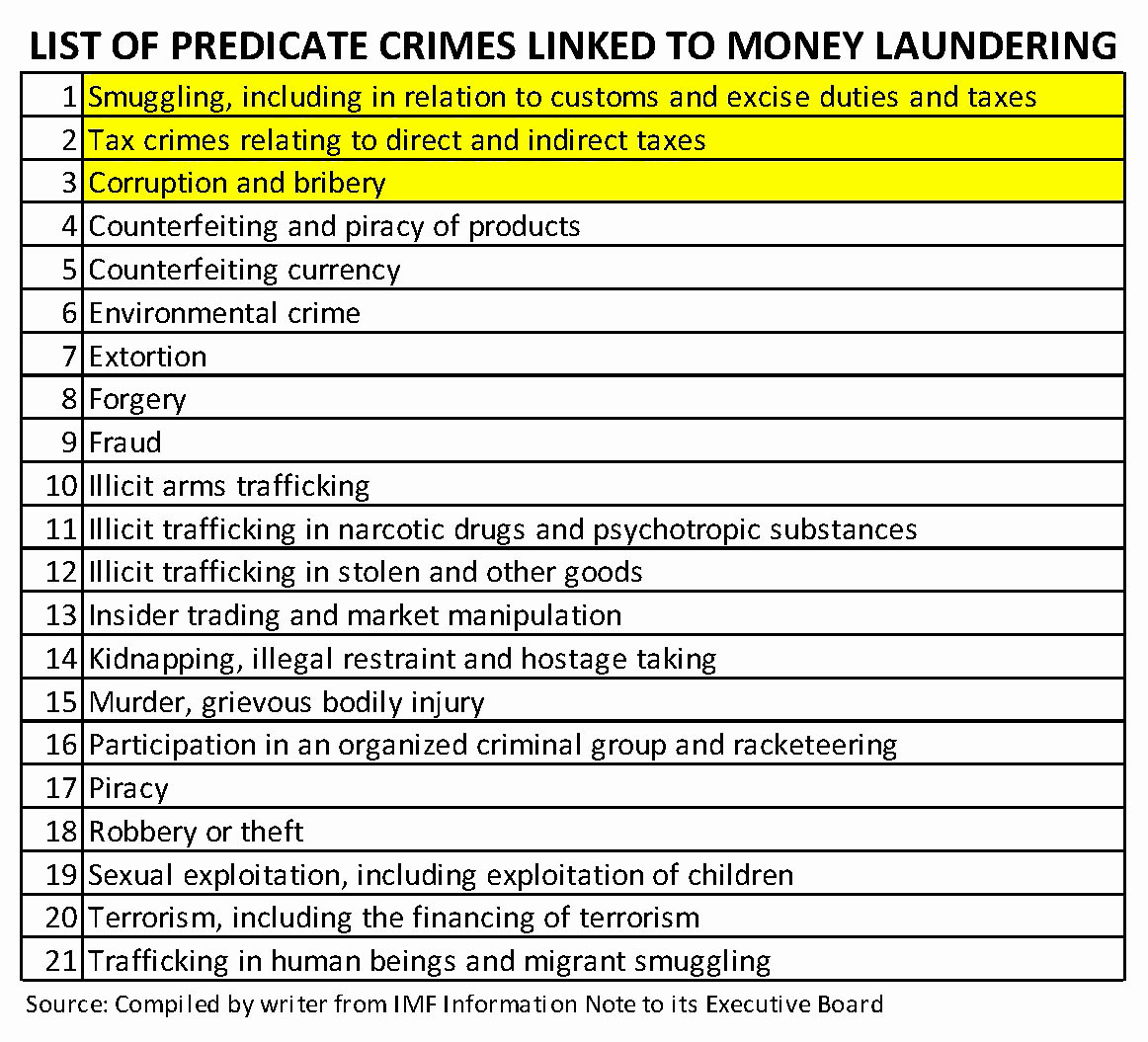(Conclusion)
Due diligence
 In the first part of this article, an effort was made to discuss some of the things that often lead to charges of non-compliance with globally accepted anti-money laundering and countering the financing of terrorism standards. The indication from that information was that in doing business, investors cannot treat financial risk as an exogenous variable which can be controlled through, for example, third party contracts with insurance companies. Businesses must treat financial risk as an endogenous variable that has to be solved simultaneously with revenue generation. The acceptance of money as a deposit or payment must be accompanied with a readiness to inquire and have disclosure about the source of the money. In other words, due diligence can only serve as a defence against accusations of money laundering if it is practiced. Due diligence becomes increasingly important when the transaction involves the cross-border movement of money where any number of the following crimes could be involved.
In the first part of this article, an effort was made to discuss some of the things that often lead to charges of non-compliance with globally accepted anti-money laundering and countering the financing of terrorism standards. The indication from that information was that in doing business, investors cannot treat financial risk as an exogenous variable which can be controlled through, for example, third party contracts with insurance companies. Businesses must treat financial risk as an endogenous variable that has to be solved simultaneously with revenue generation. The acceptance of money as a deposit or payment must be accompanied with a readiness to inquire and have disclosure about the source of the money. In other words, due diligence can only serve as a defence against accusations of money laundering if it is practiced. Due diligence becomes increasingly important when the transaction involves the cross-border movement of money where any number of the following crimes could be involved.

Cross-border movement
Money moves across borders for a variety of reasons. Money crosses borders to satisfy trade transactions. It crosses borders to satisfy investment transactions. It crosses borders to meet personal or family needs. All those purposes might be legitimate. But money crosses borders also to escape paying prescribed revenues or to hide its original source or even existence. The original source of the money is often the original source of the problem. The list above shows the 21 crimes which FATF has identified could be linked to money laundering and the financing of terrorism. They could lead to the cross-border movement of money.

The Lucas Stock Index (LSI) increased 0.46 percent during the final period of trading in March 2016. The stocks of five companies were traded with only 9,522 shares changing hands. There was one Climber and two Tumblers. The stocks of Republic Bank Limited (RBL) rose 2.73 percent on the sale of 1,000 shares. At the same time, the stocks of Banks DIH (DIH) fell 0.99 percent on the sale of 2,492 shares and that of Guyana Bank for Trade and Industry (BTI) fell 0.02 percent on the sale of 10 shares. In the meanwhile the stocks of Demerara Distillers Limited (DDL) and Demerara Tobacco Company (DTC) remained unchanged on the sale of 6,000 and 20 shares respectively.
Guyana has been plagued with charges of corruption and has been accused of doing very little to change or reduce those allegations. While there is no empirical data to support the contention definitively, three crimes in particular are closely aligned to cross-border movement of money. In the case of Guyana, drug trafficking, smuggling and bribery appear to dominate criminal activity with consequences for money laundering and the fighting of terrorism by Guyana.
The US has been citing Guyana as a transit country for illicit drugs coming from other parts of Latin America and the Caribbean. The reports also indicate that those involved in the illicit trade in drugs seem to have substantial influence over the criminal justice system in Guyana. These are troubling disclosures which make it even more necessary for the financial institutions in Guyana to know their customers very well. The success of the drug trade is not possible without the support of public officials.
Revenue loss
In a research paper done by one of my students, it was observed that smuggling has always been a problem for Guyana. Smuggling is any activity to import or export goods by evading customs control and the attempt to evade taxes on imported goods. Many individuals and businesses engage in smuggling in an effort to evade paying duties and taxes on goods brought into the country. It is estimated that successful smuggling leads to annual revenue loss of about G$30 billion. This estimate combines import duties, value-added taxes (VAT) and income taxes. Smugglers use various entry points to bring “Un-customed” goods into the country. But smugglers take their chances also at border entry points with weak or no regulatory controls. Ports such as Charity and Morawhanna come to mind.
But even in areas with a customs presence, smugglers take their chances too. They do this by offering bribes to Customs and other officials. No one is certain how much revenue is lost through bribery, but the act is of major concern to the authorities. Persons are employed to collect and regulate the collection of income for the state. These are officials who take an oath and promise to execute their duties in the interest of the county. Yet, they are willing to turn their backs on their fiduciary responsibilities and abandon the spirit and the letter of the law that they are asked to uphold. These supposedly trusted individuals hired to protect the revenues of the state often times side with smugglers and end up injuring the revenues of the country. The low level of collection of customs duties and excise taxes by the Guyana Revenue Authority (GRA) thus tells its own story of why corruption is successful in Guyana.
Lose confidence
Naturally therefore, when foreign financial institutions hear that 15,000 ounces of gold leave Guyana illegally every week, they lose confidence in the people, the institutions and the government that should be preventing this event from happening. It is a collaboration that involves the public and the private sector. Those private businesses that think that they are doing a good thing by engaging in smuggling are actually bringing greater harm to the entire country. Confronting smuggling and discouraging bribery is everybody’s business. Doing so together makes meeting FATF-compliance standards much easier and the cost of doing business in Guyana cheaper.
Politicians and other public officials need to stop monkeying around on these issues and understand that the entire country is at risk of being marginalized by the international economic community for failure to uphold its own laws. Private businesses that engage in smuggling and illicit trade practices expect the banks to accept their money without question. That should not happen if some investors insist that smuggling, tax evasion and paying kickbacks must be part of their business model. The people in the private sector just like those in the public sector need to understand that smuggling, drug trafficking and bribery are destroying this country. For as long as these illegitimate business activities are allowed to take place unhindered, the international economic pressure on this country will mount.
Slow pace
The slow pace of moving to tackle the scourge of corruption leaves every person and institution exposed to mistreatment because the consequence of money laundering is not a one-way thing. The charges of corruption increase the risk for providers and customers. As a consequence, Guyanese must be prepared to give up some of their privacy in order to convince others that they earn or acquire their money legitimately. Anything less will see Guyana being swallowed by the economic black hole.








